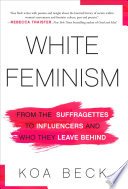White Feminism: From the Suffragettes to Influencers and Who They Leave Behind

Top of the pile
80
/100
I Index Overall Rating

Readers
Critics
Scholars
Author:
Koa Beck
Publisher:
Atria Books
Date:
January 5, 2021
Koa Beck, writer and former editor-in-chief of Jezebel, examines the history of feminism, from the true mission of the suffragettes to the rise of corporate feminism. She also examines overlooked communitiesâincluding Native American, Muslim, transgender, and moreâand their difficult and ongoing struggles for social change. She blends pop culture, primary historical research, and first-hand storytelling to show us how we have shut women out of the movement, and what we can do to course correct for a new generation.
What The Reviewers Say
Nicole Graev Lipson,
The Boston Globe
The Boston Globe
A former editor at Jezebel, Vogue, and Marie-claire.com, Beck illuminates how prejudice and elitism suffuse mainstream feminist thinking.
Elizabeth Greenwood,
San Francisco Chronicle
San Francisco Chronicle
Beck names and identifies white feminism in the hope of replacing it with a 'more holistic, ambitious approach to inequality.' Beck’s book teems with examples of how white feminism has always been an exclusive club.
Alice Burton,
Booklist
Booklist
Just in time for the hundredth anniversary of white women’s suffrage comes this masterful outlining of the progress and flaws of the feminist movement. Journalist, critic, and fiction writer Beck skillfully challenges the centralizing of white feminism.
Jane Haile,
New York Journal of Books
New York Journal of Books
The real key to the shape and tone of the book may lie in Beck’s exposure to the 'ideology' of white feminism in the offices of Marie Claire and Glamour. She has many interesting observations of the essence of this particular feminism as being not only white and elite, but also thin, capitalistic, individualistic, and exclusive. But this obliges her to find other labels for non-white, working class, collective movements of women (and non-women) activists; or to appear to contradict her own very limited characterization of feminism.















